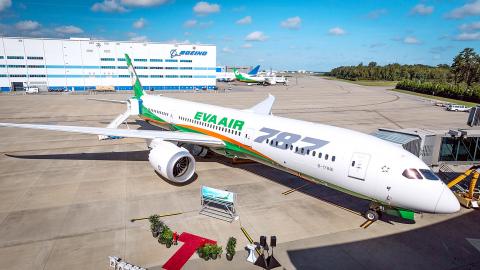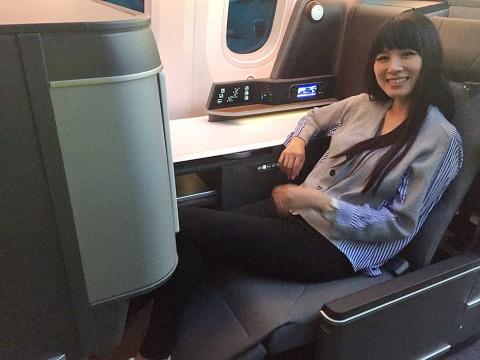EVA Airways Corp (長榮航空), one of the nation’s largest airlines, on Tuesday received delivery of its first Boeing 787-9 Dreamliner passenger aircraft at Boeing Co’s delivery center in South Carolina.
It is the first 787 Dreamliner in Taiwanese civil aeronautics history and the first in EVA Air’s planned fleet of 787s.
The Taiwanese carrier, which plans to debut the long-range aircraft on international routes next month, leased the aircraft from Air Lease Corp, a Boeing statement said.

Photo courtesy of EVA Airways Corp
“Today’s delivery marks the first of 24 Dreamliners requisitioned by the Taipei-based airline,” the statement said.
EVA Air in 2015 announced an order for 18 787-10 airplanes, along with plans to lease four 787-9s and two 787-10s from Air Lease, Boeing said, adding that it is the largest commercial airplane purchase in Taiwan’s history.
A member of Star Alliance, EVA Air serves international routes with about 565 weekly flights.

Photo: Chen I-chia, Taipei Times
Boeing said that passengers on the airline’s new 787 Dreamliner would experience EVA Air’s new Royal Laurel business class seats designed by Designworks, a BMW Group company, while EVA Air also partnered with Teague to redesign its economy class seats.
To improve the operational efficiency of its 787s, EVA Air plans to use a variety of tools available from Boeing Global Services, including a maintenance performance toolbox, airplane health management and electronic flight bags, which are tablet-based solutions for pilots that increase cost savings by removing paper products, Boeing said.
The 787-9 is the second member of the Dreamliner family, and offers 20 to 25 percent better fuel efficiency per seat and lower emissions than the first 787, Boeing said.
As the longest-range member of the family, the 787-9 can carry 290 passengers in a typical two-class configuration up to 7,635 nautical miles (14,140km), the company said.
The 787-10 is a larger version of the 787-9, although the two aircraft retain more than 95 percent in common, Boeing said, adding that the 787-10 has additional seating and cargo capacity and has 25 percent better fuel efficiency per seat and lower emissions than the 787-9.

With this year’s Semicon Taiwan trade show set to kick off on Wednesday, market attention has turned to the mass production of advanced packaging technologies and capacity expansion in Taiwan and the US. With traditional scaling reaching physical limits, heterogeneous integration and packaging technologies have emerged as key solutions. Surging demand for artificial intelligence (AI), high-performance computing (HPC) and high-bandwidth memory (HBM) chips has put technologies such as chip-on-wafer-on-substrate (CoWoS), integrated fan-out (InFO), system on integrated chips (SoIC), 3D IC and fan-out panel-level packaging (FOPLP) at the center of semiconductor innovation, making them a major focus at this year’s trade show, according

DEBUT: The trade show is to feature 17 national pavilions, a new high for the event, including from Canada, Costa Rica, Lithuania, Sweden and Vietnam for the first time The Semicon Taiwan trade show, which opens on Wednesday, is expected to see a new high in the number of exhibitors and visitors from around the world, said its organizer, SEMI, which has described the annual event as the “Olympics of the semiconductor industry.” SEMI, which represents companies in the electronics manufacturing and design supply chain, and touts the annual exhibition as the most influential semiconductor trade show in the world, said more than 1,200 enterprises from 56 countries are to showcase their innovations across more than 4,100 booths, and that the event could attract 100,000 visitors. This year’s event features 17

EXPORT GROWTH: The AI boom has shortened chip cycles to just one year, putting pressure on chipmakers to accelerate development and expand packaging capacity Developing a localized supply chain for advanced packaging equipment is critical for keeping pace with customers’ increasingly shrinking time-to-market cycles for new artificial intelligence (AI) chips, Taiwan Semiconductor Manufacturing Co (TSMC, 台積電) said yesterday. Spurred on by the AI revolution, customers are accelerating product upgrades to nearly every year, compared with the two to three-year development cadence in the past, TSMC vice president of advanced packaging technology and service Jun He (何軍) said at a 3D IC Global Summit organized by SEMI in Taipei. These shortened cycles put heavy pressure on chipmakers, as the entire process — from chip design to mass

SEMICONDUCTOR SERVICES: A company executive said that Taiwanese firms must think about how to participate in global supply chains and lift their competitiveness Taiwan Semiconductor Manufacturing Co (TSMC, 台積電) yesterday said it expects to launch its first multifunctional service center in Pingtung County in the middle of 2027, in a bid to foster a resilient high-tech facility construction ecosystem. TSMC broached the idea of creating a center two or three years ago when it started building new manufacturing capacity in the US and Japan, the company said. The center, dubbed an “ecosystem park,” would assist local manufacturing facility construction partners to upgrade their capabilities and secure more deals from other global chipmakers such as Intel Corp, Micron Technology Inc and Infineon Technologies AG, TSMC said. It